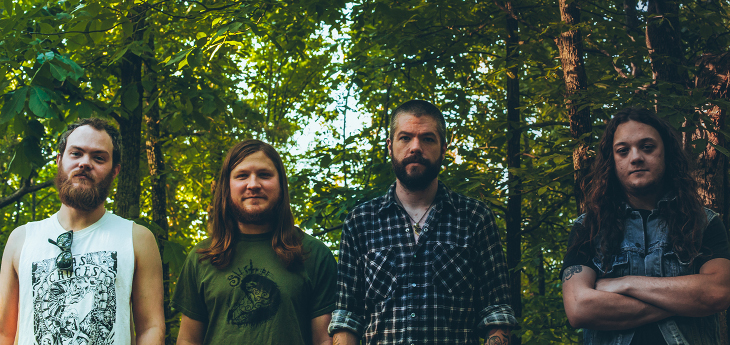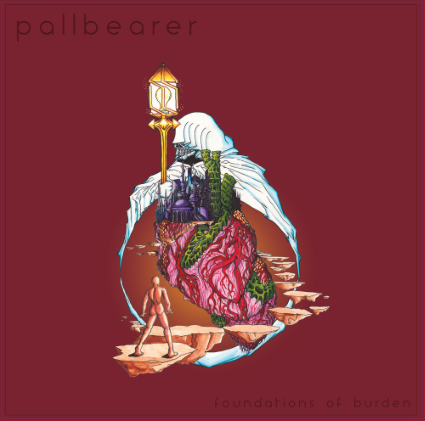Wider Spectrum: An interview with Pallbearer

Sorrow and Extinction, the acclaimed first album by Little Rock, Ark. doom metal band Pallbearer, didn’t feel like a debut album. It had the freshness of a band’s first album, certainly, but it sounded too assured and fully realized to be the work of a band in its infancy. And in a sense, it wasn’t; released in February of 2012 via Profound Lore, the album arrived after four years of performing and refinement, as well as an auspicious demo in 2010 that featured two of the album’s tracks in a rougher, rawer form. But in 2012, Pallbearer achieved a sort of critical mass in their sound, catalyzing decades of influence from doom metal and progressive rock into one triumphant and emotional whole.
People took notice — Sorrow and Extinction was released to nearly universal acclaim, and landed on year-end lists from Terrorizer, Decibel and Pitchfork (and, while we’re on the subject, Treble’s list of all-time Top 100 Metal Albums). This snowballed into a more demanding tour schedule, including a jaunt opening up for Norwegian progressive metal heavyweights, Enslaved. You could say Pallbearer had a good year.
Two years after that landmark first outing, the group is heading into August with another full-length album wrapped up and ready to drop. On Aug. 19, the band will release the two-LP Foundations of Burden, an even more massive and intricate release that apparently broke producer Billy Anderson‘s (Sleep, Neurosis, Jawbreaker) record for the most layers of guitar he put to tape for a single album. Pallbearer bassist and songwriter — and de facto spokesperson — Joseph Rowland tells Treble in a phone interview that there was really only one way forward for the new album.
“We didn’t want to make Sorrow and Extinction Part 2,” he says. ” It needed to be a record where we really challenged ourselves, and wrote something that, would, on a lot of levels, feel like where we needed to be going. We wouldn’t be happy creating something that was stagnant. We needed to be moving forward in a way that made sense, not just for the sake of doing it.”

There are, indeed, many layers of guitars on Foundations of Burden. Hell, there’s many layers of everything. It’s a particularly dense and adventurous recording — labyrinthine, even. Each song on the album — two thirds of which are longer than 10 minutes apiece — is an entire world unto itself, bridging heavier, more traditionally metal sounds with prettier, melodic interludes and harmonies. For a band that started out with such a sophisticated piece of work, this album feels even more ambitious and dynamic.
Writing songs like the thunderous “Worlds Apart” or the mesmerizing “The Ghost I Used To Be” doesn’t happen overnight, however. Rowland, guitarist and vocalist Brett Campbell, guitarist Devon Holt and drummer Mark Lierly spent the better part of two years working on their latest opus — one intricate piece at a time.
“I kind of like to look at it like putting together a puzzle,” Rowland says. “There are sections that will eventually connect with other sections. Then once it’s all there, you start to see bigger parts of the picture as it goes along.
“It’s very rare that a song is composed in a linear fashion.”
In addition to the complex musicianship that goes into their show-stopping epics, there’s always been a strongly emotional aspect to Pallbearer’s music. And those emotions are often intense, mournful or dark. — the band is called Pallbearer, after all. Still, that’s only one part of the spectrum of feeling that they evoke, and Foundations of Burden finds Rowland and Campbell — the two lyric writers in the band — focusing on ideas of regrets, growth and letting go. It’s not all entirely positive, but as evident in the lyrics to the aforementioned standout “The Ghost I Used to Be” (“With a spectral breath/ I’m begging to be freed“), Pallbearer seem all the more concerned with soul searching, and whether your regrets can define your future. These are weighty topics, but a heavy sound demands some heavy ideas to back them up.
The title of the album, Foundations of Burden, echoes this emotionally introspective outlook, which can often translate into some powerful personal experiences when the band performs these songs live.
“There’s a lot of elements of dwelling on letting go of regret. That’s a burden you carry through your life if you don’t choose to abandon it or have that burden lifted from you,” Rowland says, noting that the cathartic aspect of the music carries through to the band’s live performances. “I often find myself completely overwhelmed by the music and kind of — I lose any sense that there’s an audience. It all goes away for me. It’s definitely something I connect with on a heavy emotional level.”
The intricacy of Foundations of Burden, paired with its overall booming sound and elegantly showcased guitar wizardry, positions it in a unique place in heavy music. The music that Pallbearer makes is epic — huge, even. But it’s a pretty safe distance from traditional. For as much influence as the band takes from Black Sabbath or Candlemass, there’s a sense that what they’re doing falls on the fringes of the doom spectrum. Rowland voices his agreement that Pallbearer isn’t echoing the “Peaceville sound,” and even drops another, loaded P-bomb when discussing the group’s artier tendencies.
“I would be off base saying, ‘We’re not a doom metal band,'” he says. “I wish it would be easier to say ‘We’re a heavy prog band.’ You can’t deny the most significant elements of the band are drawing off of doom metal. We’ve had a lot of discussions about how into progressive rock we are. And while the feeling was there on Sorrow and Extinction more than any real substance to it, it’d be pretty hard to deny that record was very obviously a doom metal record. Now, the spectrum is so much bigger that the pigeonholing mentality is not as easy.
“I don’t really feel like at this point that Foundations of Burden is completely a doom metal record,” he continues. “There are too many things at play … I’m not going to deny that they’re doom metal. But on the whole I don’t think it’s that easy to classify. That’s just our natural tendency, I think. We enjoy melody a lot.”
As tricky as it may be to define just where Pallbearer fits in on a metal or prog scale, on some level, it’s not all that important. The group’s appeal has transcended a niche audience, and as they prepare for the release of their next album — and a headlining fall tour in support of it — they appear to be on the cusp of a new level of both artistry and commercial success.
And they’re ready for it.
“The capability to go out and do this and be able to share this music on a way bigger level than we would have otherwise is really important to us,” Rowland says.
“It’s changed our lives in a lot of ways.”
You might also like:




